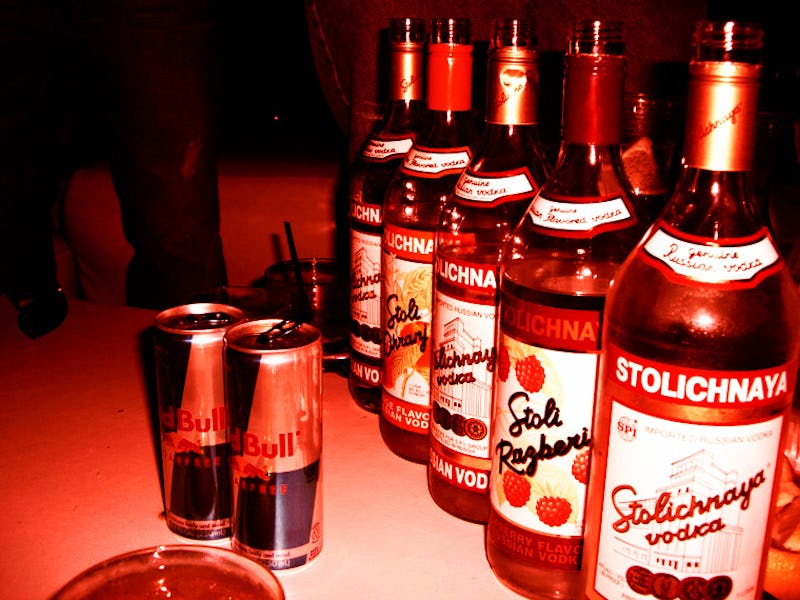Fans of Red Bull and Vodka Take a Big Risk, Scientists Warn

To the drunk brain, rationalizing another order of a Red Bull and vodka is easy. Alcohol makes the brain too hazy to party, and a jolt of caffeine clears away the fog. More sober minds, however, say the simple math of all-night celebration is completely invalid. Caffeine plus alcohol, the researchers behind a new study argue, adds up to nothing but bad decisions.
A team of psychologists at the University of Victoria came to this conclusion after analyzing the results of 13 studies, published between 1981 and 2016, on energy drink cocktails and their effects on the people drinking them. In their review, published in the Journal of Studies on Alcohol and Drugs, they found that 10 of the studies linked consumption of these cocktails with an increased risk of falling, fighting, and other accidents, compared to ingestion of non-caffeinated booze, though they weren’t able to calculate an exact risk of injury (the study results were too varied, they said). Still, as anyone who’s ever consumed too many of these drinks can probably attest, this finding isn’t surprising at all.
If it appears that people who drink vodka-Red Bulls (or Jägerbombs, rum and Red Bull, Four Loko, or any other variation on the booze-spiked energy drink) seem drunker than the average partygoer, that’s because it’s probably true.
“When people consume alcohol with the energy drinks, they get that ‘awake’ effect and they feel more alert, so they think that they’re less drunk than they actually are, but they’re not,” Audra Roemer, a Ph.D. candidate and the lead author of the study, tells Inverse. “They’re still just as impaired as they were before but they feel a more alert.”
The effect she and her team are concerned about is that people who are “wide awake drunk” end up drinking more than they should, getting drunker than they can handle, and ending up having accidents.
Like Four Loko before it, vodka-Red Bull cocktails mask a person's perception of drunkenness.
Whether mixing energy drinks and alcohol is linked to actual health problems will require larger-scale studies, they write. The health effects of either component of a vodka-Red Bull, however, are well documented. It’s known, for example, that short-term alcohol consumption can lead to anxiety and memory loss, while long-term drinking habits can cause high blood pressure, brain damage, and liver problems. Caffeine intake of more than 500-600 mg of caffeine daily (a standard can of Red Bull contains about 80 mg, while a can of Coke has about 23 mg) can lead to insomnia, nervousness, stomach problems, a racing heart, and even muscle tremors, according to the Mayo Clinic. While Red Bull’s 80 mg of caffeine may seem benign compared to the 100 mg in a cup of coffee, keep in mind that energy drinks contain a huge amount of sugar, which also plays a big role in fueling wide-awake drunkenness.
Is this trend going to continue? “Energy drinks are definitely still pretty popular,” Roemer says, but she hopes that policymakers will recognize the risks the cocktails pose and perhaps impose rules to limit their availability. “Certain bars limit the sale of the two drinks together,” she says, offering a suggestion for how to mitigate this issue. She’s certainly right that the popularity of energy drinks isn’t waning — a 2015 report predicted the energy drink industry would grow annually by 5.8% between 2013 and 2021 — but that could mean that further studies on the health risks of the energy drink-alcohol combo are on their way. In the meantime, she says, it’s probably best to reconsider your drink order.
“You have sodas that have a fraction of the caffeine and stimulants that an energy drink would have,” she says. “So that’s important to keep in mind.”